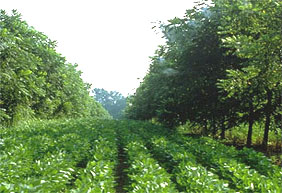|
Agro-forestry
conducive for better crop production
Dr. Rashid A. Khan
Dr. Tahir Siddiqui
Shahid Hafeez
Due to the prevailing extreme climatic conditions, tree-crop inter-culture (agro-forestry) is indispensable for profitable farming in the country. Farmlands without trees become exposed to harsh edaphic, physiographic and climatic factors. Trees protect farm crops, ameliorate climatic conditions, lower down water table, redistribute nutrients in the soil profile and provide many other fringe benefits. is indispensable for profitable farming in the country. Farmlands without trees become exposed to harsh edaphic, physiographic and climatic factors. Trees protect farm crops, ameliorate climatic conditions, lower down water table, redistribute nutrients in the soil profile and provide many other fringe benefits.
Normally, fast growing, short rotation, deciduous, straight stem and deep-rooted tree species are recommended for farmlands to reduce tree-crop competition and to boost up overall farm income. At the time of independence our forest legacy was almost 4.5 per cent of the total area, but the forest department could not increase even 1 per cent forest cover in the country during the last 50 years.
Thus, the existing situation has forced them to switch over to social/farm forestry, which is actually not the job of forestry graduates in the light of their training in high timber forestry. At present, agro-forestry seems to be the only practicable option to increase the forest wealth. Basic preconditions like good soil, regular water supply and post planting cares to develop trees are lacking in state forests but available on farmland.
Agro-forestry should come under the administrative control of the ministry of agriculture for the following reasons: * Department of agriculture has a huge infrastructure where agro-graduates are appointed to manage agriculture and the other sister disciplines. They are well trained extension workers in the fields of agro-forestry, poultry, fisheries, livestock and dairy development in addition to their own specialization in farm crop production. * Due to their very intimate and enduring links with farming communities, the extension wing of agriculture department can properly guide the farmers as to why/how/where and to what extent the agro-forestry be practised on farmlands. * All agricultural universities are imparting agro-forestry education for promoting the knowledge of this very crucial sub-discipline of agriculture. Presently two-third area of forest is lying unproductive and consequently the Punjab Forest Department is spending three times more (Rs120.6 million) than its earnings to maintain the meagre forest resources and to pay staff salaries. If only 10 per cent of the unused forestland is temporarily leased out to farmers, the department would earn (Rs106 million) or 250 per cent more revenue.
Besides this, 31000 ha fertile but degraded forestland will be made productive, environment will be improved and leaseholders will earn an additional revenue of Rs652 million from their agricultural produce. An economic analysis of Chichawatni irrigated tree plantation shows that the total cost of growing trees was Rs5465 per acre and total income received was Rs1659 per acre, which made pure high timber forestry an unprofitable enterprise.
Similar results have been concluded in an economic analysis of Kamalia irrigated tree plantation. Agro-forestry on the other hand gives almost 200 to 300 per cent more returns. Following necessary steps be taken to boost up wood production in the country: * All saline and waterlogged government land should be allotted/leased out to landless farmers. The funds available in the National Drainage Project should be spent on raising nurseries to provide planting material to farmers at nominal or no cost.
* All irrigated plantations should be leased out to local landless farmers for agro forestry practices with the condition that each farmer will grow at least 400 trees per acre on his farmland. * Management of canal side and road-side plantations should be given under the management of adjoining landowners on both sides (e.g. a landowner having five acre cultivated land along road/canal be given five acre road/canal side land for management purpose) with the condition to maintain a forest cover. In return they should not be charged water rates and land rent for those five acre of adjoining fields.
Even earthing-up of roadside/canal-side and de-silting of canals can be handed over to adjoining landlords with little more incentive, which can automatize the entire system throughout the country. Agriculture officers may be given the duties to check the work and to advice, warn, or prosecute the defaulters. * Agriculture officers should be given funds for raising tree nurseries and the saplings should be distributed among farmers according to local soil conditions and demand of wood market.
The working of forest department should be confined to high hill forestry zone (northern area) for which they are actually trained. These are sensitive areas from watershed point of view and thus require intensive management for cutting down erosion, assuring regular river flow, enhancing power generation, increasing life of dams and controlling floods. * Tree species like poplar, simal and eucalyptus should be declared as farmer trees to be planted on farmland (private enterprise) only.
The state foresters should not be allowed to grow the above said trees in state forests (government enterprise) to reduce competition among them in selling wood. Wood treatment plants: Few years ago when eucalyptus was introduced in Punjab, it was agreed that one paper mill each at Kamalia and Mandi Baha-uddin, and many wood treatment plants will be installed but the commitment has not been honoured. Import of wood: Pakistan is also deficit in producing quality timber and the gap is filled by importing wood and wood products. Installation of wood seasoning, preservation and processing units in forest areas areas could play a pivotal role in enhancing the production of quality wood. It will also reduce import of wood and wood products and will increase utilization of locally produced processed wood.
|
Pakissan.com;
|